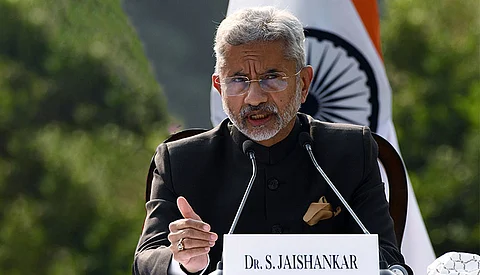
- Home
- About
- Globally Speaking
- Videos
- Podcast
- Geopolitics
- Industry
- SIGN UP

India is looking beyond its immediate neighbourhood. Central Asia is looking beyond the great wall. The two regions have a chance of mingling like never before.
A number of concrete measures have been taken to strengthen ties after the first meeting in Samarkand. India extended a $1 billion line of credit for priority developmental projects.
India's eight-year old Connect Central Asia policy that seeks to expand the ambit of its sphere of influence beyond its immediate neighbourhood is getting further impetus in Prime Minister Narendra Modi's second tenure in office. On October 28, India and the five stans--Kazakhstan, Turkmenistan, Tajikistan, Uzbekistan and Kyrgyzstan, held their second meeting of the India-Central Asia Dialogue virtually. Established in 2019, it is a platform created specifically to expedite ties between the two regions.
A number of concrete measures have been taken to strengthen ties after the first meeting in Samarkand. India extended a $1 billion line of credit for priority developmental projects in Central Asia and also offered grant assistance for implementation of high impact community development projects. Just before the pandemic brought the world to a halt, the India-Central Asia Business Council comprising of chambers of commerce of all the countries involved was also set up in New Delhi. As the virus took hold, India also extended humanitarian medical assistance to the region.

“India and Central Asia share ancient historical and cultural linkages. We consider Central Asia as India's 'extended neighbourhood'. As developing countries, we share common perspectives on opportunities and challenges for the development of our countries and the prosperity of our people,” said Dr S Jaishankar, minister for external affairs at the dialogue. “We also share commonality of views on various regional and international issues. We face common challenges of terrorism, extremism, drug trafficking and such other issues. All these commonalities make us a natural partner in our developmental journey.”
More to read:
The five stans sit at the heart of Eurasia and historically comprise half of the ancient Silk Route. Its strategic importance in geopolitics has made it a subject of the Great Game with active players like the big European nations, US, Russia and China.
The five stans sit at the heart of Eurasia and historically comprise half of the ancient Silk Route. Its strategic importance in geopolitics has made it a subject of the Great Game with active players like the big European nations, US, Russia and China. Post the collapse of the Soviet Union in 1991, which led to the birth of these nations, they found themselves battling low GDP and high inflation and looked to the world for help. Preoccupied with its own set of problems, India has been a tad late to the party and has been pipped by China which has made deep inroads into the region.

The dragon's ambitious Belt and Road Initiative for example, has a major play in the region ushering in billions of dollars worth of investment in infrastructure in these countries. Not all of it is convenient though. Built on a foundation of loans and grants given over decades, it has also exposed the countries to the risk of a debt trap--something that has also similarly played out across the world from Sri Lanka and Africa all the way to Latin America. The stans are now wary of China and while there is no comprehensive push back yet, they are eager to build relationships with players like India.
Still more to read:
Traditionally, India's attempts at furthering ties with the region have been constrained by its relations with Pakistan, which has blocked direct access over land. It has however circumvented that problem with the development of the Chabahar port project in Iran, which gives it a direct gateway to the Central Asian countries.

In 2018, India was also admitted into the Ashgabat agreement which gives it right to use existing land connectivity networks and also access natural resources of the region. Though the decision to invest in the Chabahar project was taken in 2003, it was only followed up in earnest under Modi's leadership in 2015 with the signing of the memorandum of agreement. The worsening of Iran-US ties in 2018 put a cloud over the future of the project but India underlined its intent by doubling budgetary allocation for it to Rs 100 crore in fiscal 2021.
Besides the geopolitical significance, the region also holds importance for India for its energy needs. Central Asia is well endowed with oil, gas and uranium reserves. Kazakhstan has 15 percent of world's uranium reserves and is the largest producer accounting for more than third of the global supplies. Similarly, Turkmenistan has the world's fifth largest natural gas reserves--its Galkynysh gas fields are the world's fourth largest.

Following Modi's visit to the region in 2015 when he became the first Prime Minister to tour all five countries in a single trip, relations have gained fresh impetus. In 2019, India and Uzbekistan signed a long-term contract for supply of uranium while at the same time the decision to renew the pack with Kazakhstan was also taken.
There is still a lot of work to be done and challenges to be overcome before India's relations with Central Asia realize their true potential. What is certain is after long, the stars are finally aligned for the two regions to gainfully mingle with each other.